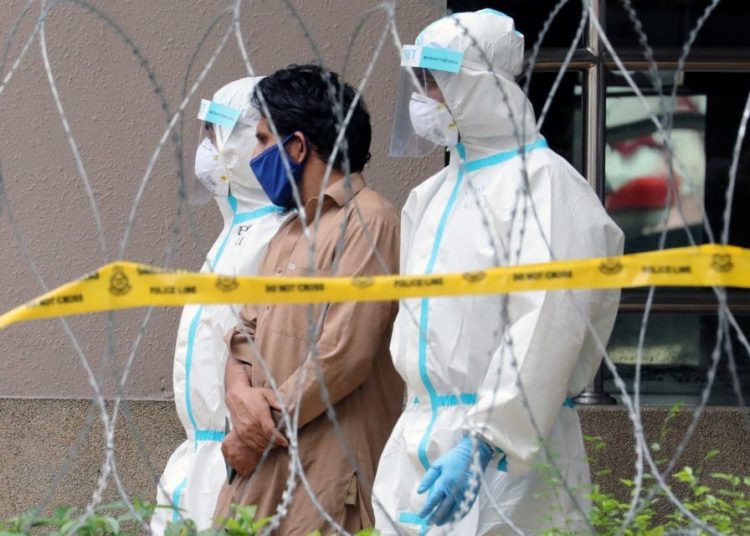Amnesty International Malaysia is deeply alarmed by reports of growing numbers of cases of COVID-19 among those in immigration detention centres and in residences of migrants. According to the Ministry of Health, a new cluster was detected in the Putrajaya Temporary Immigration Detention Centre on 31 May, adding to three existing clusters that were earlier identified in immigration detention centres in Bukit Jalil, Semenyih, and Sepang. 410 detainees have tested positive for the virus as of 31 May.
“Not only have undocumented migrants and refugees been taken to detention centres notorious for their poor conditions and the human rights violations committed there by detaining authorities; their health and lives amidst the COVID-19 pandemic have also been put at risk. These centres have the potential to become the epicentre of the virus spreading, similar to what happened in Singapore where cases within migrant workers’ dormitories increased exponentially,” said Preethi Bhardwaj, Interim Executive Director of Amnesty International Malaysia.
Immigration crackdowns
On 22 April, Immigration Director-General Datuk Khairul Dzaimee Daud stated that there would be no raids against undocumented migrants during the implementation of the Movement Control Order (MCO). Raids, however, were subsequently carried out by the Immigration Department and Royal Malaysian Police in areas under Enhanced Movement Control Order (EMCO) that are heavily occupied by migrant communities. Masjid Jamek, Selayang Baru, and Petaling Jaya Old Town have since seen mass arrests of hundreds of migrants, including children.
“Detainees being cramped together in overcrowded spaces, where social distancing is impossible to observe, and under unhygienic conditions can lead to increased risks of COVID-19 infections,” said Bhardwaj.
“Amnesty International Malaysia calls on the government to immediately release those detained under the MCO and act urgently to decongest detention centres to prevent COVID-19 outbreaks. Treatment must be given to detainees who have tested positive for the virus. Those who are not infected must be given access to adequate preventative measures that all in Malaysia have, without discrimination,” said Bhardwaj.
Hate speech and xenophobia
Amidst the threat of COVID-19, many have taken to blaming migrants and refugees for exacerbating the spread of virus. An uptick in the hateful messages against migrants and refugees on social media has been observed.
“We call on Malaysian authorities to publicly denounce xenophobic and racist sentiments against migrants, which are at risk of escalating if not addressed” said Bhardwaj.
“We are deeply concerned that the authorities themselves are repeating hateful lies and stereotypes in relation to migrants. Government statements saying that undocumented migrant workers who are not detained can spread the virus to other people are not grounded in fact and ultimately counterproductive to pandemic mitigation efforts,” continued Bhardwaj.
On 22 May, Defence Minister Dato’ Sri Ismail Sabri Yaakob stated in a press conference that Malaysians should be worried about migrants who are not detained as they could spread the virus to other people. On 26 May, he also said that infected undocumented migrant workers could spread the coronavirus to “our own innocent citizens” if not detained.
“These statements are extremely dangerous as they perpetuate false stereotypes and lead to the greater persecution of already vulnerable communities. The Malaysian government should take an active role in preventing the spread of misinformation against migrants and refugees through a reliable and prompt system of accurate information, instead of actively discriminate against them,” concluded Bhardwaj.
Background
Malaysia was placed under a Movement Control Order (MCO) on 18 March, as announced by Prime Minister Muhyiddin Yassin on 16 March. Under the MCO, social and religious gatherings were prohibited, and educational institutions and non-essential businesses and services were shut down. On 1 May, MCO regulations were relaxed under the implementation of a Conditional Movement Control Order (CMCO), with the goal of reopening Malaysia’s economy in a controlled manner. The CMCO was slated to run from 4 May to 12 May but has since been extended to 9 June.
On 27 March, it was announced that certain areas where large clusters of COVID-19 infections are detected would be placed under an Enhanced Movement Control Order (EMCO). Residents of areas under EMCO would not be allowed to leave their houses, and visitors are not permitted to enter these areas. Since the lifting of the EMCO in Petaling Jaya Old Town on 21 May, no new areas have been placed under the order.


